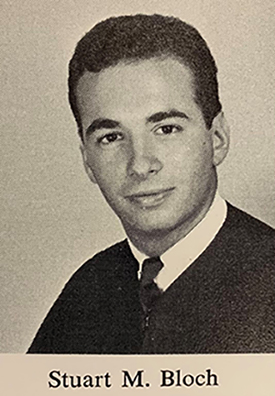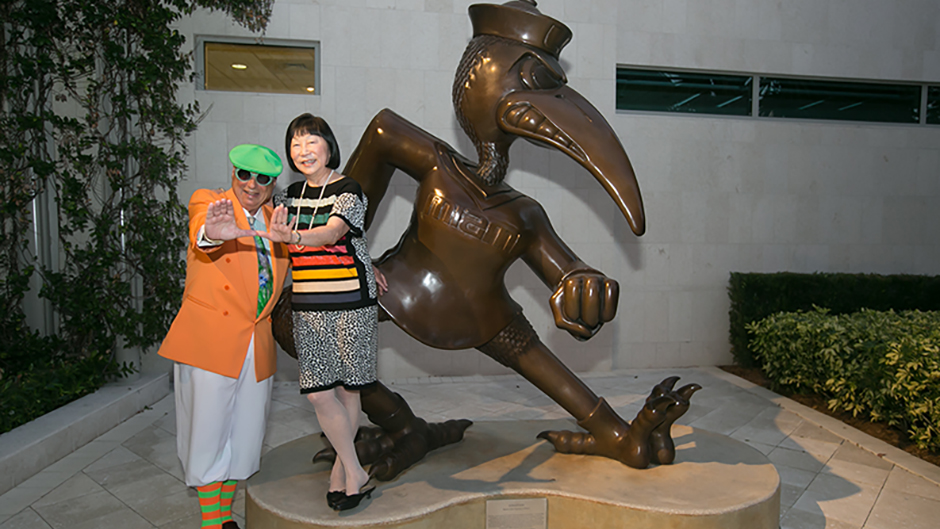One day in 1962, Henry King Stanford, newly named the third president of the University of Miami, received an impromptu visit from a student named Stu Bloch.
A Michigan resident, Bloch had arrived at the University in 1960 on a golf scholarship and quickly established himself as a campus leader. A November 1961 profile in The Miami Hurricane student newspaper called him “The Doer” and hailed his “story of service” to the University.
Bloch was a sophomore, executive secretary of the Pep Club— “I had the mic at all the rallies and at the stadium for the football team”—assistant Homecoming chairman, and member of Orange Key, the University’s leadership honor society. He had just been elected president of the undergraduate student government (USG).
“It was at the end of my second year [when the University] brought in Henry King Stanford,” Bloch recalled. “I had a little Ford Falcon—not a fancy car—and I was on my way home to Detroit. I drove through Birmingham, Alabama, where Dr. Stanford was president of a very prestigious small school called Birmingham Southern. I stopped, knocked on his door, and I said ‘Hi, I’m Stu Bloch; I’m president of the university student body, and I understand you’re the new president of the University of Miami.’”
“As Dr. Stanford later wrote, ‘the most audacious student arrived at my door and started to tell me how to run the university.’”
That doorstep encounter marked the beginning of a lifelong friendship; Bloch remembers Stanford as “a rare, rare person.” And in Bloch’s view, Stanford’s arrival in Coral Gables marked an inflection point—one of several during this period—in the University’s maturing as an academic institution. As Bloch said, “what we did at the University in those days helped make it the place it is today.”
One such point was a change in the degree of autonomy afforded students.
In the early 1960s, campus life was strictly controlled, as part of efforts to elevate the University’s academic standing and prestige. Student dress codes and curfews were enforced, and all student social events were subject to stringent approval procedures, among other measures. There were, as Bloch put it, “more rules and regulations than you could possibly imagine.”

Bloch, along with his close friend, USG Vice President Michael Klein, who later endowed a faculty chair in the School of Law, and Elayne Gilbert, the first female managing editor of The Miami Hurricane, lobbied against such heavy-handedness, and for greater transparency in both student government and University administration.
President Stanford’s arrival on campus signaled a new era. “Dr. Stanford didn’t make abrupt changes when he came in,” Bloch said. “He observed, and [then] he made us into how a university is supposed to be—a place where people came to expand their ideas. We had to be diverse, and we had to have freedom of expression.”
The Cuban Revolution heralded another inflection point for the University, which until that time had little diversity. “These were talented people, they were doctors and lawyers, teachers, businessmen, the intelligentsia, and they had to get out of Cuba, and when they came, they had nothing,” Bloch said of the first wave of Cuban exiles.
Bloch and his Pep Club colleagues organized collections of food and clothing for newly arrived Cuban students, and he promoted them in student government and honor societies. “I said, we have to make sure these students are integrated into the student body,” Bloch recalled. “And we’re going to get them involved in student government. I made sure that whatever I did, that Cuban students were part of it. It was the first [major example of] diversity at the University and it was wonderful.”
One of the first Cuban students he befriended was Fred Berens, B.B.A. ’63, M.B.A. ’64, whom Bloch brought into student government, and who later became a member of the University’s Board of Trustees.
Bloch also advocated for women in leadership positions. Upon stepping down as president of the Interfraternity Council, for example, he nominated classmate Roselee Nichols (later Roberts), A.B.’64, to succeed him.
His efforts echoed Stanford’s staunch support of diversity—the University had admitted its first Black students in 1961—and the latter’s public advocacy in South Florida for acceptance of an integrated University community.
By the time of his graduation in 1964, Bloch had been inducted in Iron Arrow, served as president of his fraternity, interned at the Peace Corps as special assistant to its then-director, Sargent Shriver, and represented the University at the 1963 March on Washington. He attended Harvard Law School and built a successful career in banking.
After graduation, Bloch maintained strong connections to his alma mater, as a founding member of the President’s Council, chair of his 25th and 50th class reunions, and a champion of the Newman Alumni Center. And for the past 53 years he has enjoyed what he calls his greatest achievement, his marriage to Julia Chang Bloch, whose distinguished career in public service culminated in her appointment as Ambassador to Nepal in 1989, making her the first Asian-American in U.S. history to hold such rank.
In 1995, the Blochs made a gift to the University to establish the Distinguished Alumni Lecture Series (DALS), with the goal of highlighting alumni who have brought distinction on themselves and the University. Stu Bloch’s friend Michael Klein, B.B.A. ’63, J.D. ’66, was the inaugural speaker, and for the next 13 editions, an array of accomplished alumni spoke to on-campus audiences on important issues of the day.
By 2019, Bloch was looking to expand DALS and bring it to a wider audience of students, alumni, and friends of the U. With his and Julia’s enthusiastic support, the University transformed DALS into a virtual panel discussion of timely, important issues, featuring dynamic speaker lineups, rich content, and an interactive feature that draws scores of listener questions and comments.
Bloch is excited for the future of the series, and the way the new format increases the audience, showcases the breadth and depth of intellectual power at the University, and gives a voice to a wide range of alumni making a difference in their respective fields.
“I’m very proud of the DALS,” Bloch said. “We’ve had some fabulous lectures and we’re going to expand it and preserve it even more. Having it [virtually] has not inhibited it at all. In fact, it’s almost a better vehicle—it’s been terrific for the expansion of the program.”
Looking back at his 60-plus years of involvement with the University of Miami, Bloch takes pride in how much the U has grown and evolved. “I’m most proud of my association with Miami because of how far they’ve come. From where they started, the growth has been astonishing. And I’m so proud that I played a small role.”

